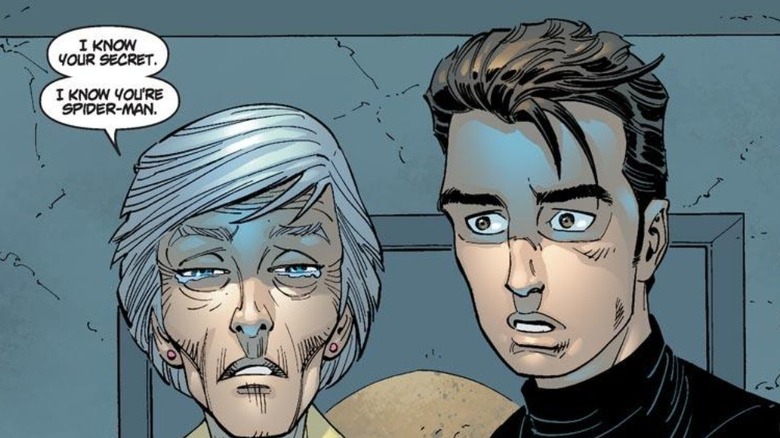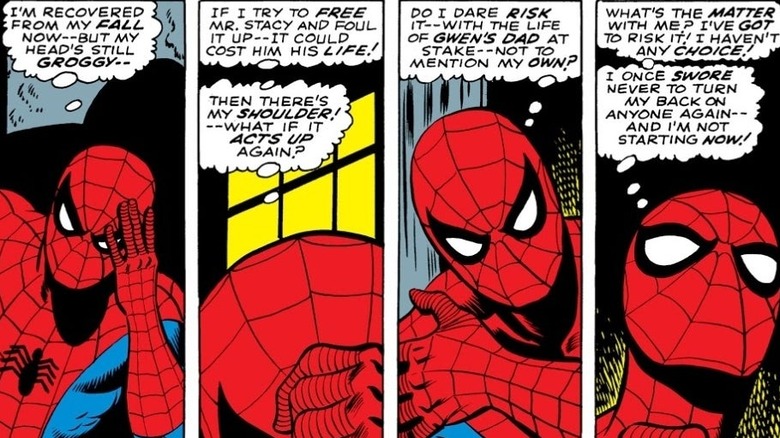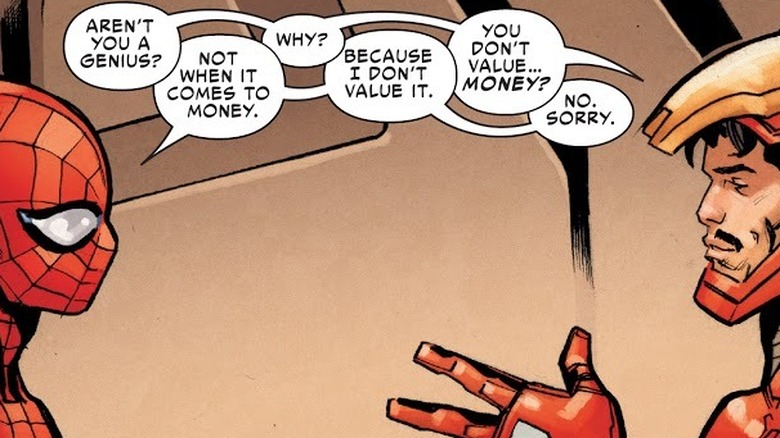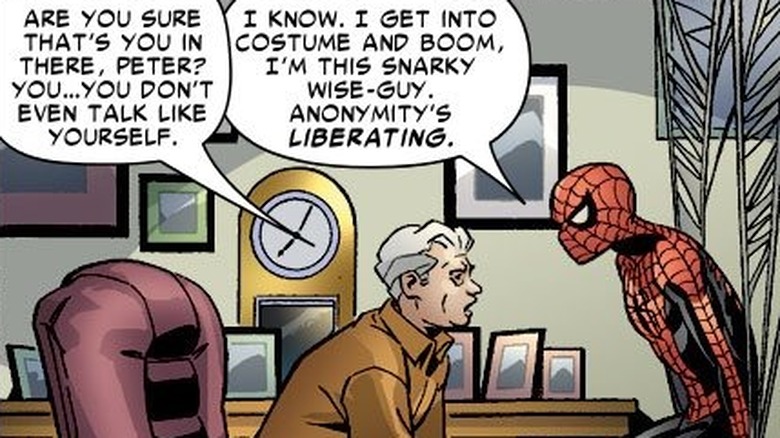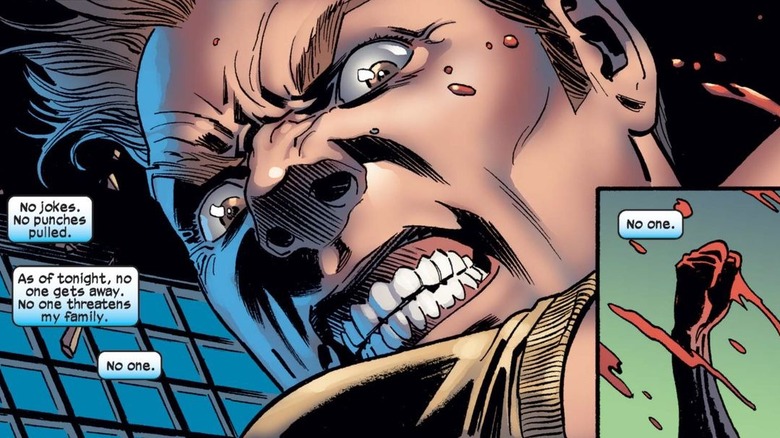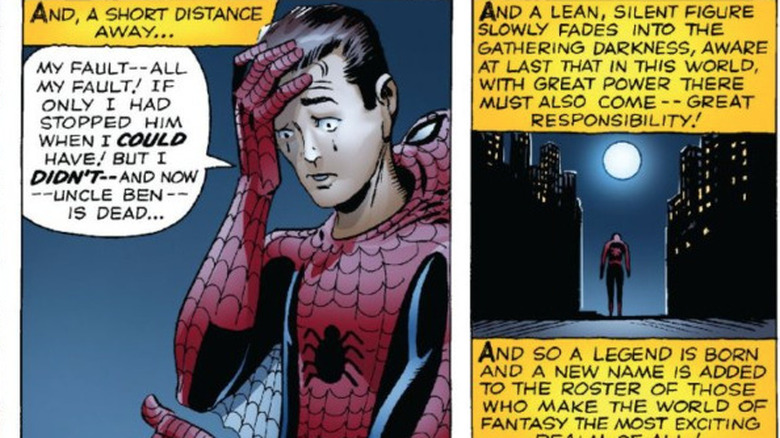Advice We Learned From Spider-Man That You Should Totally Avoid
Being a well-known superhero and pop culture icon, it stands to reason that Spider-Man would be considered by many as a fictional role model. For starters, few statements embody the values of heroism and sacrifice quite like the mantra that has become most famously associated with him: "With great power comes great responsibility." Plus, anyone who follows his story in the comics, on TV, or in his silver screen appearances would be impressed by how he never wavers from the path of righteousness, no matter how difficult things get in the personal, professional, or superhero sides of his life.
That said, being a role model doesn't mean that Spider-Man is an all-knowing font of wisdom and good advice. In fact, many of the wondrous webslinger's thoughts, actions, and insight would translate quite badly in the real world — leaving you beaten up, cancelled, bankrupted, alone or even killed.
This doesn't just cover the more outrageous situations he has found himself in over his decades-long career, including wearing a dangerous alien as a costume and making a deal with the literal devil. Many of the choices Spider-Man has made as a typical human being only work out for him because of his amazing spider-powers (and because if they don't, well, Marvel would lose its most profitable superhero).
While it's okay to find inspiration in Spider-Man's heroic example, fans ought to be wary of the supposedly sensible advice and lessons his stories impart. Unless you're a science-loving quipster in a spider-themed costume with superpowers, don't try this at home.
Protect your loved ones by keeping secrets from them
Peter Parker's rationale for keeping his identity a secret has always been to protect his loved ones from Spider-Man's enemies. He certainly has a point: If Spider-Man's civilian identity were public knowledge, it would be very easy for a villain with an ax to grind to, say, walk over to the Parker residence and punish Aunt May for the mortal sin of being related to the wisecracking superhero. As the movies (with "Spider-Man: No Way Home" being a good example) and comics (in stories like "Civil War") have shown, Peter's fears aren't completely unfounded.
However, keeping your secret identity hidden from the rest of the world and keeping your dual life a secret from the people you care about are two completely separate matters. While the former makes perfect sense, the latter only puts the people in your life at even greater risk. How can they prepare for potential threats to your (and their) security if they're not even aware that such threats exist in the first place? Wouldn't arming them with knowledge be their best defense against any harm that might come their way?
Applied in real life, keeping your loved ones in the loop isn't just a smart decision. It's also one that shows just how much you trust them, respect their intelligence, and perhaps most importantly, recognize their competence and ability to deal with difficult situations.
Rely on your instincts to stay safe from danger
One of Spider-Man's many spectacular gifts is his uncanny "spider sense," a form of low-level psychic ability that warns him (in a rather non-specific way) of any impending danger. When combined with his incredible agility and reflexes, this unique ability allows him to get out of harm's way, "see" in pitch darkness, or even react preemptively to immediate threats by striking first.
While this amazing ability to sense danger before it arrives has saved Spider-Man's hide countless times, it has also been a double-edged sword for him on certain occasions — specifically, like when it proves to be unreliable or plain ineffective. For example, two of his most dangerous opponents, Venom and Carnage, are immune to his spider sense, which puts the superhero at a severe disadvantage. There have also been times when he has outright lost his precognitive sense — and since he is so dependent on it, these instances effectively cripple his ability to avoid danger. One time, he even had to take martial arts lessons from Shang-Chi just to compensate for his missing spider sense.
In the real world, some people choose to believe their gut when making important decisions or facing dangerous situations. While blindly trusting your instincts sometimes does pay off (and can be impressive when it works out), it is best not to depend too much on gut feeling alone.
Take risks, even without thinking things through
Throughout his crime-fighting history, Spider-Man has become famous for being the hero who prevails against all odds. Many of his significant adventures feature him making the most out of a terrible situation he's in (often due to his own decisions) and saving the day in the nick of time, despite having the cards stacked against him. Whether it's obtaining an important serum to save the life of his dying aunt or faking his death to trap a deadly foe on a deserted island, Spider-Man has never been one to shy away from putting himself in harm's way for the greater good.
While Spider-Man's bravery and bullheadedness certainly help him become a more effective superhero, they also highlight his propensity to take risks, even when he hasn't had time to think them through. On one hand, this shows that when faced with difficult choices, the wall-crawler will always act in a manner that puts others before himself. On the other hand, it may also be a sign of his own super-powered hubris — a seemingly underlying belief that as the hero of his own story, he will be able to consistently snatch victory from the jaws of defeat.
Sadly, while this kind of behavior works in a fictional setting, it can lead to disastrous consequences when applied in the real world. More often than not, the best course of action in a dangerous situation is to prioritize how you can minimize risk.
Prioritize altruism over financial security
Spider-Man's relationship with money has been both a recurring theme and a running joke in pretty much all iterations of the character: He rarely has enough of it, and is always in need of it. Despite having a brilliant scientific mind capable of creating impressive inventions like web fluid or miniaturized tracking devices, rarely does Peter get to cash in on his pre-Spider-Man talents, usually because he chooses to save lives as a costumed hero instead of focusing on holding down a steady job and bolstering his professional career. During the few occasions when he does get to flex his scientific acumen and make some serious dough (like when he joined Horizon Labs as a scientist or became the CEO of his own company), they always end with him abandoning an otherwise stable source of income in the interest of continuing to be Spider-Man.
As his iconic '60s cartoon theme goes, Spider-Man has ignored wealth and fame, with "action" simply being his reward. While his general detachment from money in the interest of altruistic pursuits is certainly an admirable trait, it's also a bit irresponsible, in a sense. After all, he still has bills to pay, and the people in his life depend on him having a stable source of income. That's not to say that every action should be motivated by money — it just helps to remember that if you really want to help others, you should help yourself first.
It's okay to take the law into your own hands
As Spider-Man, Peter finds himself at odds with a colorful assortment of evildoers, from your garden variety bank robber to your totally-not-garden-variety time-displaced intergalactic despot. Using his powers, Spider-Man is able to subdue these threats, often leaving them for the cops or whichever cosmic peacekeeping force happens to be on speed dial to deal with. And while this all seems good and even admirable on paper, it also ignores one major problem with the actions of Spider-Man (and pretty much every other superhero): Well-intentioned, costume-clad vigilantism is still vigilantism.
Spider-Man operates as one of New York's many self-appointed superpowered guardians. Often, his timely interventions are able to prevent massive disasters and loss of life. However, they also tend to create a slew of problems for law enforcement. Processing criminals' papers for their detainment and prosecution becomes a challenge, for example, since being webbed up by Spider-Man doesn't count as a proper arrest. Then there's the issue of property damage: Who pays for every mailbox that Spider-Man smacks the Green Goblin with, or for all the cars that the Rhino chucks at the webslinger?
Spider-Man isn't even a properly-trained operative, meaning everything he knows about fighting crime is from experience and a lot of trial and error. In real-life situations, when the safety and well-being of the community is at risk, this is simply inexcusable — and far too dangerous for all involved.
Your demons are yours alone to fight
For most of his career, Spider-Man has been a perpetual loner. As a teenage superhero, his brash behavior, general inexperience, and impetuousness earned him the ire of nearly all the adult crime-fighters he co-existed or teamed up with. Over time, he learned to become more of a people person among fellow superheroes, though many of them still find his sense of humor and awkward talkativeness to be off-putting. It also doesn't help that Spider-Man has a tendency to prefer dealing with things alone — and while he's not above instigating the occasional team-up in order to deal with threats way above his strength class, he often takes it upon himself to handle problems alone, typically in the interest of keeping others safe or out of a misplaced sense of responsibility (along the lines of "That's my villain, and therefore my mess to take care of").
There have been countless situations in the comics where Spider-Man calling in someone like Daredevil or the Fantastic Four could have saved him a lot of time and effort, especially since they're all in the same city. As an adult, he even joined the Avengers' official roster, after years of being a mere reservist. The key lesson here is that it's okay to ask for help, and that being responsible doesn't always mean handling difficult situations all by yourself.
Expect the people who love to understand you unconditionally
As anyone who is a significant part of Peter Parker's life across the multiverse would tell you, being in his social or familial circle means you have to prepare yourself for disappointment on a regular basis. Whether it's his annoying tendency to suddenly disappear during critical situations or his inability to fulfill commitments because things never seem to stop coming up, you'd better be ready to understand and adjust to Peter — and to never receive a proper explanation as to why he's so unreliable.
Of course, the omniscient audience knows exactly why this is the case: Peter's dual life as Spider-Man often gets in the way of responsibilities in his civilian life. Occasionally, it can cause his loved ones — especially the ones who are aware of his secret identity — severe emotional distress. In the classic story "Kraven's Last Hunt," for example, Kraven the Hunter buries Spider-Man alive for two weeks, leaving Peter's new wife Mary Jane to deal with tremendous anxiety — and the very real possibility that the man she just married is dead — all by herself. While it certainly isn't Peter's fault that an unhinged supervillain caused his extended disappearance, it's undeniable that this is a direct consequence of him being Spider-Man.
In the real world, a person should not expect their loved ones to perpetually adjust and make exceptions while keeping them in the dark. Trust and honesty go both ways, after all.
Anonymity lets you liberate your worst self
Whenever the shy, reserved, and socially awkward Peter Parker puts on the mask of Spider-Man, it's as if he becomes a different person. His secret identity becomes his primary outlet for letting out his frustrations, practicing his snappy comebacks, or plainly just himself loose from societal pressure. This works to the superhero's advantage, because having a different personality from his civilian alter-ego allows him to put up a strong front against his enemies and pull off feats that he otherwise wouldn't be able to as Peter Parker.
Indeed, there's just something about being able to hide behind another persona and act in a way that disregards consequences you would otherwise worry about if you were using your true identity. Take today's anonymous apps, for example, which enable users "to vent, confess, or share secrets with strangers while going incognito" (via New York Magazine).
However, just because you can behave like a different person after assuming a different identity doesn't mean it's okay. While being anonymous (especially if it's online) can feel quite liberating, that freedom to speak or act without pressure has to come with some degree of self-restraint as well. Your thoughtless words and actions can bring harm to the people you interact with, even if they don't know who you are or what your real face looks like.
It's totally fine to mock your enemies
One of the most memorable and hilarious sequences in the "Ultimate Spider-Man" comic book series happens in issue #12, when Spider-Man comes face to face with the Kingpin ... and pulls out a long list of insults that he nonchalantly reads out to his beefy enemy. This scene stays true to the core of Spider-Man's relationship with villains in general: He routinely mocks them in combat, partly to throw them off their game and partly to hide his own insecurities and anxiety.
However, what may appear to be cool and fun on the comic book page may not necessarily translate well into everyday life. For instance, many of Spider-Man's foes have gone on record as saying that the thing they hate most about him is his steady stream of jokes. In other words, by adding insult to injury, Spider-Man makes the battle personal for many of his enemies. In real life, making more people mad at you isn't exactly a logical thing to do — and the easiest way to accomplish that, unfortunately, is by having a smart mouth that disregards their feelings.
So remember this the next time you get into an argument: Setting up that "mic drop" moment where you absolutely destroy your opponent with hurtful words isn't as satisfying as you think — and rarely turns out well for both parties involved.
It's okay to sacrifice everything for family
In the "Back in Black" storyline, Spider-Man's Aunt May gets hit by a sniper's bullet that was intended for him. This was the direct result of Spider-Man deciding to reveal his secret identity to the world in support of the Superhero Registration Act. As his aunt lays dying in a hospital bed, Peter dons the black costume and hunts down the men responsible for his mother figure's precarious predicament. In the end, while he is able to exact brutal vengeance on the mastermind behind the shooting, he is forced to make a deal with the devil, Mephisto, in order to save his aunt's life and manipulate the world's collective memory of his secret identity. In doing so, Peter effectively gave up everything else in the other facets of his life — from his marriage to Mary Jane Watson to the friendships and trust he had built with the superhero community over the years — just to keep Aunt May alive.
Of course, crafting unholy deals with hellish creatures is hardly an option for folks who live in a non-fictional world. That said, there is still a lesson to be learned here that can be applied in everyday life: The decisions that you make — even those that are for the benefit of your family — can have tremendous ripple effects that you need to seriously consider.
It's your job to save everyone
Spider-Man once made a vow that for as long as he's around, no one will die. That promise covers everyone, from innocent civilians to even his most dangerous enemies. Thus, it's not surprising that he's willing to do things that an otherwise normal person would be unlikely to do, like take a bullet for the Green Goblin (in "Amazing Spider-Man" #800).
For a fictional hero like Spider-Man with amazing abilities, it's easy to make such a huge promise and actually fulfill it. For a person living in the real world, though, it's neither realistic nor healthy to become the self-appointed protector of everyone around you. That's not to say you shouldn't do your best to keep your loved ones out of danger, especially if you have the power and opportunity to do so. What this does say, however, is that you shouldn't be too hard on yourself for not being there for everyone all the time — and you certainly shouldn't blame yourself if people find themselves in dangerous situations that you aren't really responsible for.
Remember that you can only do so much to help the people around you. You have your own set of problems and fears to deal with — and you can only be of service to others if you're in the right condition and state of mind to do so. Trying to save everyone is a fool's errand — a naive, unrealistic path that will likely lead to self-ruin.
When you fail to act, something bad will always happen
Ever since Peter's Uncle Ben died at the hands of the burglar that the young hero failed to stop, he has been carrying with him a sense of guilt that simultaneously motivates and torments him nearly every single day. As Spider-Man, he holds on to the belief that great responsibility comes hand in hand with great power. Or, as the MCU version of Spider-Man (portrayed by Tom Holland) puts it: "If you can do the things that I can, but you don't, and then the bad things happen, they happen because of you."
While this is a noble mantra — and certainly one that an individual with super-strength, fast reflexes, and a built-in early warning system can afford to live by — it isn't one that can be realistically applied in every situation. Whether you like it or not, the real world is far too complicated to be reduced to such simplistic, black-and-white sentiment. Taking action isn't always the best course of action, and inaction doesn't always lead to harm. The best thing to do is to make decisions on how to act based not just on facts, but also on the limitations of your own abilities.

